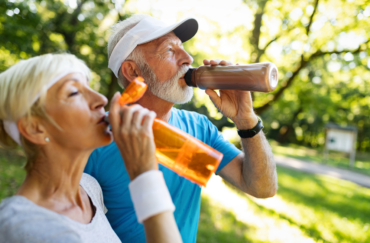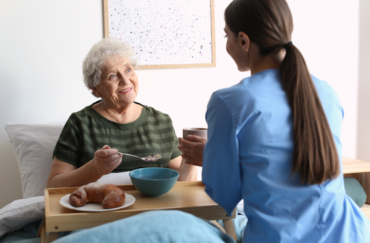Dehydration in Elderly
Bridges Health Services has been in operation, servicing, nursing, and caring for some of the highest risk patients in skilled nursing, assisted living, or at home. Our services have been proven to lower hospitalization rates, prevent falls with injuries, and manage pain to optimize comfort. As mutual stakeholders in delivering geriatric care, an often overlooked issue is hydration. Geriatric residents are increasingly susceptible to dehydration due to physiological changes in sodium and water balances that naturally occur with age.
Some age related factors that increase the risk of dehydration include:
- Diminishing sense of thirst
- Decreased ability to eat/ drink independently
- Reduced renal function and fluid regulation
External Factors that increase the risk of dehydration include:
- Side effects of certain medications (particularly diuretics)
- Dehydration in result of medical procedures
- Poor nutrition through dietary options
- Acute illnesses, or diseases
Consequences of dehydration can be detrimental to the geriatric population. Increased hospitalizations, decline in cognitive function, weakness, fatigue, skin breakdown, and incontinence/increased urinary frequency are all common side effects of dehydration. These consequences, combined with other chronic conditions, can contribute to poor health outcomes.
For the reasons listed above Bridges Health Services prides itself in educating families, patients, facilities, and all other relative stakeholders on being prepared and trained to prevent and mitigate these situations. Bridges Health Services can reduce these risks by using our Home Health, Hospice, and Palliative Care programs to provide the following:
- Skilled Nursing, Physical, Occupational, and Speech therapy and/or Chaplain, Social Work, Volunteer services
- Routine communication with your chosen Medical Doctor/Provider
- Education and training for our patients, their families, and their care teams
- Intermittent visits to check vitals, progress, and health condition
- Updates to patient/resident care plan to monitor progress and changes in condition
- Changes in medication
- Initiate referral/consult to specialists
- Maintain compliance to licensing guidelines
At Bridges Health services, patients come first. For more information on how we can collaborate in caring for your loved or residents health or to learn how we are tackling dehydration in geriatrics feel free to contact us at: info@bridgeshealthservices.com
Sources:
“Dehydration in the Elderly.” British Nutrition Foundation, https://archive.nutrition.org.uk/nutritionscience/life/dehydrationelderly.html.
Mayo Clinic Staff. (2019). Dehydration.
mayoclinic.org/diseases-conditions/dehydration/symptoms-causes/syc-20354086





